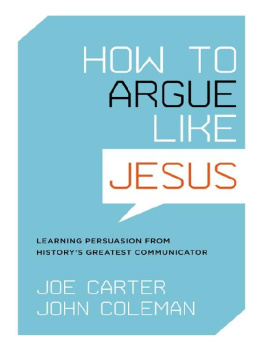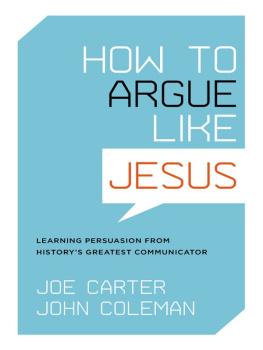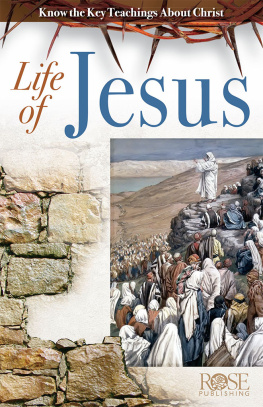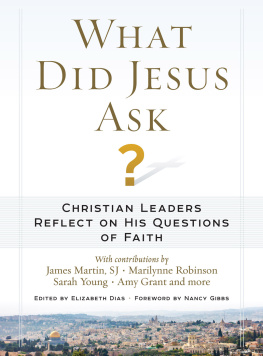How to Argue Like Jesus will help communications professors to teach angelically. Carter and Coleman Christianize Aristotle and add heavenly heuristics that show how Jesus used story and imagery, and how we can go and do likewise.
MARVIN OLASKY, Provost, The Kings College, New York City; Editor-in-Chief, World magazine
This engaging and edifying study by two gifted Christian writers shows that Jesus understood better than all the others both who he was talking to and what they needed to hear. It turns out that the right kind of straight talk really can confound the smooth experts, and being rhetorically effective doesnt have to be at the expense of your good name. This is a genuine self-help book.
PETER LAWLER, Dana Professor of Government, Berry College; author, Homeless and at Home in America
Anti -intellectualism plagues the modern church, but the best response is not a false intellectualism. How to Argue like Jesus falls into neither trap. It effectively teaches logic and critical thinking in the context of a well-lived life. This is what the church needs.
JOHN MARK REYNOLDS, Founder and Director, Torrey Honors Institute
How to Argue Like Jesus

How to Argue like Jesus
Copyright 2009 by Joe Carter and John Coleman
Published by Crossway Books
a publishing ministry of Good News Publishers
1300 Crescent Street
Wheaton, Illinois 60187
All rights reserved. No part of this publication may be reproduced, stored in a retrieval system or transmitted in any form by any means, electronic, mechanical, photocopy, recording or otherwise, without the prior permission of the publisher, except as provided for by USA copyright law.
Cover design: Chris Tobias
First printing, 2009
Printed in the United States of America
Scripture quotations are taken from The Holy Bible: English Standard Version .Copyright 2001 by Crossway Bibles, a publishing ministry of Good NewsPublishers. Used by permission. All rights reserved.
All emphases in Scripture quotations have been added by the authors.
Mobipocket ISBN 978-1-4335-0560-7
PDF ISBN 978-1- 4335-0559-1
Library of Congress Cataloging-in-Publication Data
Carter, Joe, 1969
How to argue like Jesus : learning persuasion from historys greatest communicator / Joe Carter and John Coleman.
p. cm.
Includes bibliographical references and index.
ISBN 978-1-4335-0271-2 (tpb)
1. Influence (Psychology)Religious aspectsChristianity. 2. Persuasion (Psychology). 3. CommunicationReligious aspectsChristianity. 4. Jesus ChristTeaching methods. I. Coleman, John, 1981 . II. Title
BV4597.53.I52C37 2008
232.9'04dc22
2008014231
VP 19 18 17 16 15 14 13 12 11 10 09
15 14 13 12 11 10 9 8 7 6 5 4 3 2 1
JOE CARTER:
To
Misty and Samantha
JOHN COLEMAN:
To
Jackie, Shea, John, Chris, and Dustin
CONTENTS
CHRIST THE COMMUNICATOR
EMOTIONAL JESUS
JESUS THE LOGICIAN
JESUS AS SHEPHERD, SAVIOR, TEACHER, AND FRIEND
THE STORY AND STORIES OF A SAVIOR
SPREADING AND SUSTAINING THE MESSAGE
RHETORICS RULES OF THUMB
W riting How to Argue like Jesus has been a satisfying and truly collaborative effort, and there are dozens of people we must thank for making it a possibility.
We are deeply grateful to Crossway Books for offering two first-time authors a chance to present our ideas and then working tirelessly to make those ideas a reality. In particular, the staff of Crossway Books, including Ted Griffin, Josh Dennis, Amy Stephansen, Justin Taylor, Allan Fisher, and Jill Carter, have spent countless hours encouraging us, editing our work, and pushing to bring this publication to market. Without their diligence, this would not be possible.
We also appreciate the efforts of our friends, peers, colleagues, and mentors who have reviewed portions of the book and offered feedback. Sandy Feit, Peter Lawler, Jackie Coleman, John Mark Reynolds, Jeremy Pierce, Randy Richardson, Chip Hall, Blair Schermerhorn, and Michael Papazian have all supplied comments that made this work inestimably better. We thank them, and we hope they realize the crucial role they played in the final product.
CHRIST THE COMMUNICATOR
H is speaking career lasted approximately three years. Born into a Jewish family in an overlooked part of the Roman Empire, Jesus of Nazareth spent most of his thirty-three years working with his hands. We know very little of his early life except that he lived in obscurity. There were exceptional moments: wise men from another empire visited him shortly after his birth; seeking his death, a self-conscious local prefect executed thousands of babies; and at least once he surprised his elders by conversing freely with the religious leaders in the Temple. But apart from these rare moments of distinction, the man who would later launch the worlds most popular religion spent 90 percent of his time on earth doing manual labor and living with his humble family, in a humble place, at a time when it was bad to be a Jew and worse to be a Nazarene in a land controlled by Rome.
He was a blue-collar worker with a lower-caste accent, and yet at the age of thirty, he put down his hammer and took to the streets. Speaking to crowds throughout Israel, this carpenter shook the message of traditional Judaism to its core. Where the religious leaders of his day focused on legalism, nationalism, and isolation from the outside world, he preached a message of love, humility, and restoration. Where the textual scholars hid away from the people and exercised a harsh religious code, he preached openness, love, and the need for a salvation that relied not on works but on the grace of God. Where others cast stones, he forgave. Where others passed by the poor, outcast, immoral, and destitute, he fed them, lingered with them, went into their homes, healed them, and spoke with them about their struggles and ideals. Where others saw fishermen, prostitutes, and tax collectors, he saw a group of disciples capable of changing the world.
Jesus never wrote a book, held office, or wielded a sword. He never gained sway with the mighty or influential. He never claimed a political victory. He never took up arms against the governing powers in Rome. Two thousand years after his death, billions of Jews, Muslims, Christians, Hindus, agnostics agree that he never preached a word of hate to gain influence with his followers. He did nothing for which those followers must now be ashamed. He was quiet but firm. He used the spoken word to disseminate a revolutionary message that would eventually spread from a small-town wedding in the deserts of the Middle East to the heights of power in Rome, Western Europe, Africa, and the modern United States.
Its telling that one of Jesus followers, John, described him quite succinctly as the Word (John 1:1, 14). A symbol. A promise. An exhaled message of hope. A piece of communication strong enough to bridge the divide between God and man. The fulfillment of a story thousands of years in the making. It was in part through his revolutionary rhetoric that this humble man rose to prominence as the most influential figure in history.
How did he do it? Thats the question we hope to answer, at least partially, with this book. Modern scholars study public figures from Cicero to Hitler with excruciating detail to discover the secrets of their rhetorical success. Laymen reach for books on communication written by professors and CEOs that document the ways in which twenty-first- century businesspeople can succeed in negotiations and motivate their organizations. History buffs read the speeches of Winston Churchill and Abraham Lincoln in search of the proper principles of persuasion. But few peoplewhether Christians or non-Christianslook back to this man, Jesus of Nazareth, as an example of rhetorical excellence. We read The Republic to commemorate the brilliance of Socrates and watch film of Martin Luther King to remember the power of a dream, but we rarely look back to the man whose arguments and speeches in spite of all oddsobscurity, powerlessness, and executionrevolutionized human history.
Next page













